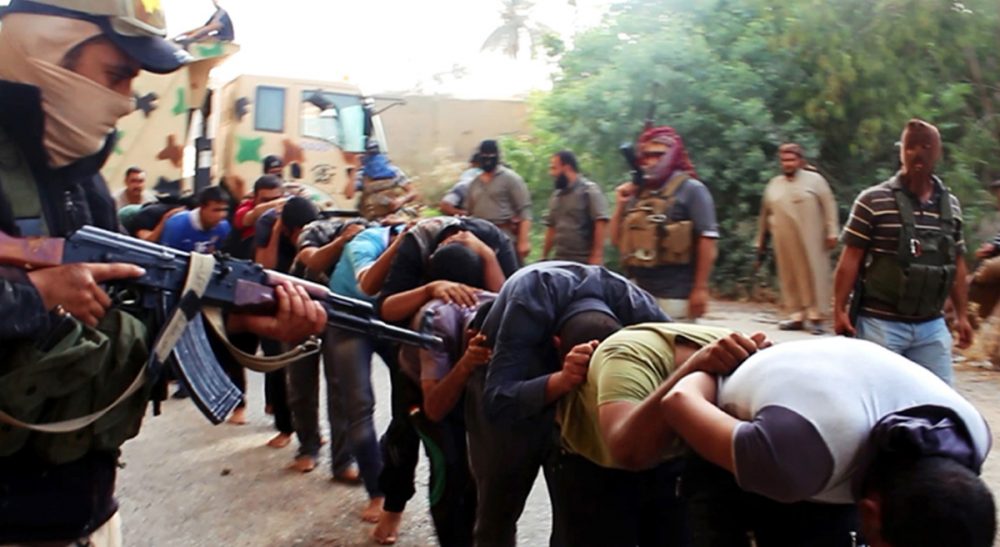Advertisement
The Legacy Of Unlearned Lessons, And The Current Crisis In Iraq

The advances of the extremist group Islamic State of Iraq and Syria (ISIS) deep into the heart of Iraq from its base in Syria is an occasion for introspection in the United States. But the lessons learned in these last few days are weak.
The unfolding debacle has many sparks, and the commentariat has been active in assigning blame. The proximate cause — the civil war in Syria, which gave rise to many radical Islamic insurgents — is one magnetic pole of recrimination. The withdrawal of U.S. troops from Iraq in 2011 is another. The granddaddy of scorn-worthy U.S. actions is the Iraq War begun by President George W. Bush in 2003.
Two major factors are being overlooked, however. One does stem from the Bush war. The other springs from regional dynamics in which the United States has put itself in the wrong corner.
Two major factors are being overlooked... One stems from the Bush war. The other springs from regional dynamics in which the United States has put itself in the wrong corner.
The swiftness of ISIS’s advances (which are likely to be reversed eventually) has startled many observers. The apparent victories in Mosul, Tel Afar, Tikrit and, earlier, in Fallujah, seem nearly unbelievable given the size and technological advantages the Iraqi army has over the extremists. What Americans have failed to appreciate, however, is how devastated Iraq was by the U.S. war and how that is affecting Iraq now.
The death toll of the war, measured by the most advanced scientific methods, was between 500,000 and 700,000 Iraqis. Much of that killing took place in the area ISIS is now sweeping through. It was preceded by 12 years of United States-imposed sanctions that resulted in child mortality in the hundreds of thousands. Four million Iraqis were displaced, either as refugees or within Iraq, during the 2003-2011 war. So Iraq has been hollowed out, its “social capital” drained and its politics fractured by sectarianism fueled by violence and loss.
As a result, security in Iraq is fragile and fragmented. Juan Cole, a leading Middle East scholar, made the acute observation that the small ISIS force could not have succeeded as it has without local cooperation of some significant kind. Arab Sunnis in Iraq feel vulnerable (the central government in Baghdad is dominated by Shiites) and exhausted, alienated from the Shiite-dominated army.
That is why it’s important to understand the scale of violence and the causes of mortality in wartime, not only for immediate military tactics and moral considerations, but because a high level of carnage will have deleterious effects for a generation or more. Few in the U.S. government or opinion elite have grasped this cardinal fact.
The second overlooked factor is the broader region’s politics. ISIS was borne of the Syrian civil war and funded by the Saudis, Kuwaitis and Qataris, all of them U.S. allies, supposedly, in the Gulf. The reason why these monarchies are trying to bring down Syrian President Bashar al-Assad is because of his alliance with Iran. The monarchies have always feared Iran’s revolutionary zeal and its appeal to the Arab street; the Saudis, moreover, have a sizable (and politically repressed) Shiite minority.
This anti-Iran animus, mainly a religious dispute rather than a response to anything Tehran has actually done, has been encouraged by the United States as a wedge against Iran. The Bush administration and Obama’s former secretary of state, Hillary Clinton, have frequently invoked the concerns of the Gulf monarchs about Iran as a pivotal reason for the tense suspicion that has animated the U.S.-Iran rivalry. Given their history (they also funded Sunni Arab insurgents during the U.S. war in Iraq), the monarchies could well appreciate a victory by ISIS over Shiite Baghdad, which they also consider to be an adversary.
...Iraq is a place where Iraqis suffered because of America, and still suffer. That’s the lesson we need to learn.
American policymakers have few good options after the colossal miscues of the past dozen or more years of war. Arabs do not want Washington meddling in their affairs. Military intervention makes no sense. Cooperating now with Iran, which very much wants to reverse ISIS gains, is possible but will not lead to broader cooperation as long as Tehran also supports Assad, Hamas and other actors that are hostile to U.S.-defined interests. The best that can be done is to hope that Iraq Prime Minister Nouri al-Maliki survives and moves toward some sort of rapprochement with Arab Sunnis after ISIS is tamed — if it is.
Many commentators blame Maliki first and foremost, and he deserves the criticism. The tragic tale was unfolding long before Maliki came on stage, however. The sheer brutality of the war and its human cost wrote the script for this disaster. America’s longtime vendetta against Iran set the stage. It all points to the sad conclusion that the United States continuously missteps in the region, supporting the wrong bad boys, tolerating bad behavior from allies, intervening at the wrong time in the wrong way, piling up casualties and then walking away muttering how little we’re appreciated.
Someone tweeted the other day, “Iraq is a place where Americans suffered.” More importantly, Iraq is a place where Iraqis suffered because of America, and still suffer. That’s the lesson we need to learn.
Related:
